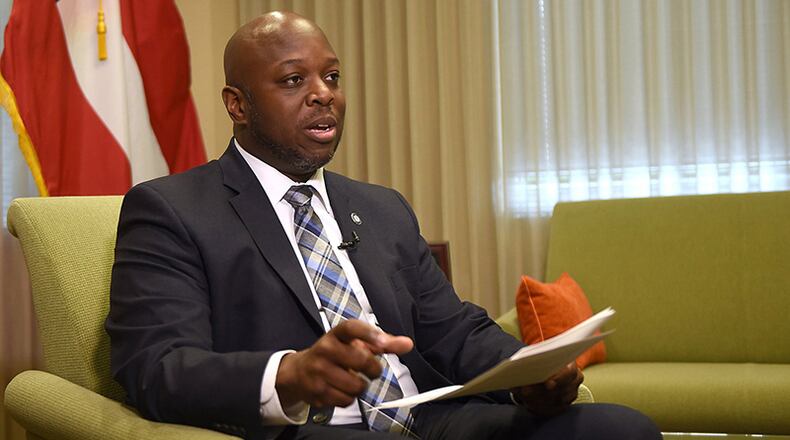The Georgia Department of Corrections is short nearly half of its corrections officers due to a high job-turnover rate, Commissioner Tyrone Oliver told state lawmakers during budget hearings Thursday.
The shortfall comes despite a heavy recruiting effort that has led to a doubling of job applicants. Of the department’s 5,991 budgeted corrections officer positions, 2,985 are vacant.
Oliver told the joint House and Senate appropriation committees that a media campaign is yielding results for the agency, with applications increasing from about 300 a month to more than 700 a month. He said the campaign has resulted in the hiring of 670 corrections officers since November 2022.
“We’re making headway in our recruitment and retention efforts,” Oliver said.
The department has hired more corrections officers and employees than it lost over the past nine months and decreased its turnover rate from 47% in fiscal 2022 to a projected 32% by the end of fiscal 2024 on June 30, he said.
During a presentation of Gov. Brian Kemp’s budget request, Oliver asked lawmakers for an additional $2.5 million in the next fiscal year to continue recruitment efforts, totaling $6.1 million.
As directed by Kemp, the agency is asking for $7.1 million to give all employees a $1,000 bonus in the current fiscal year.
It is also asking for $21.7 million to increase officers’ salaries by $3,000 and an additional $21.2 million to increase all prison employees’ salaries by another 4% next fiscal year. Currently, corrections officers’ starting salaries are $40,000 for those working at minimum-security prisons and $43,000 for those working at maximum-security prisons.
State Rep. Alan Powell called the Department of Corrections “one of the most critical pieces of the criminal justice system.”
“We pay all of these folks — law enforcement to enforce laws, we pay the (district attorneys), we pay the judges to go through the process,” Powell said. “These folks have got to have somewhere to go at some point, and that will be the Department of Corrections.”
Even with better pay, a job monitoring violent and mentally ill people can be a hard sell. Increasingly violent inmates, nearly 15,000 known gang members and troves of contraband make working in prisons the hardest job in law enforcement, Oliver said.
Oliver said the 15,000 gang members in prison are only those the Corrections Department has verified.
“‘I’m pretty sure those numbers are low, just like the statewide numbers outside of prisons is not accurately reflected,” he said. “But what I can say is that our (gang) population is growing, especially within our female population. That’s steadily increased over the years. And so we’re closely monitoring that and making sure that we keep a handle on the gangs.”
The agency is also asking for $5.6 million before this fiscal year ends in June for safety, security and technology efforts that include locating contraband and detecting drones — which sometimes are flown over the gates to drop contraband in the prison yard.
During an Atlanta Journal-Constitution investigation last year, Oliver called contraband the “driving force” for the violence both inside the state’s prisons and in the outside world.
The governor also proposed putting $65.3 million this fiscal year into improving health care in prisons, which has been a longtime issue, and an additional $72 million in fiscal 2025.
Oliver said of the nearly 52,000 inmates across Georgia prisons, the agency treats 14,000 for mental health issues and about 19,000 for chronic illnesses such as diabetes and cancer. The prisons dispense more than 99,000 prescriptions per month.
Capitol Recap: The 2024 Legislative Session
Want to know what legislators did this past week and how it might affect you? Check out our weekly newsletter, Capitol Recap: The 2024 Legislative Session, every Friday.
To subscribe, go to https://www.ajc.com/subscribe-2024-legislative-session/.
About the Author
Keep Reading
The Latest
Featured




